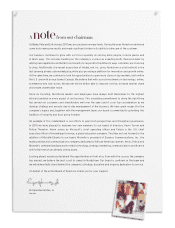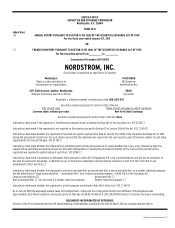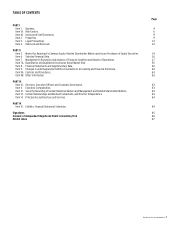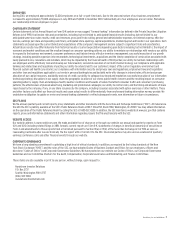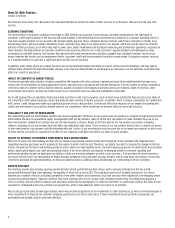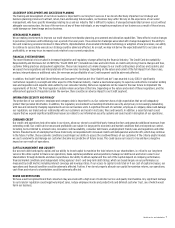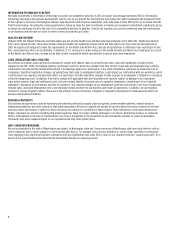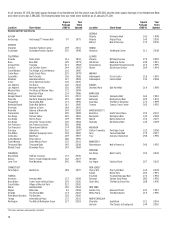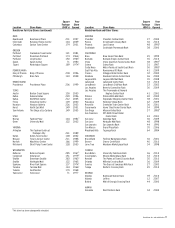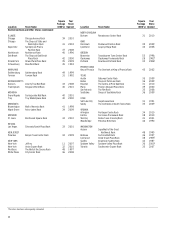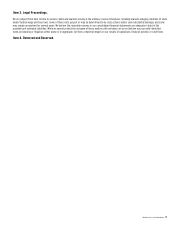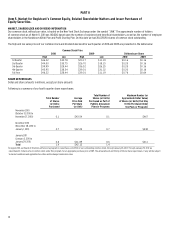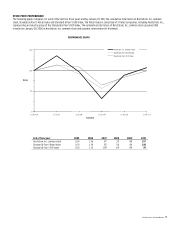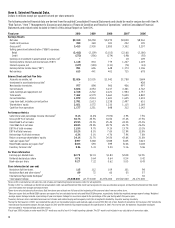Nordstrom 2010 Annual Report Download - page 15
Download and view the complete annual report
Please find page 15 of the 2010 Nordstrom annual report below. You can navigate through the pages in the report by either clicking on the pages listed below, or by using the keyword search tool below to find specific information within the annual report.Nordstrom, Inc. and subsidiaries 7
LEADERSHIP DEVELOPMENT AND SUCCESSION PLANNING
The training and development of our future leaders is important to our long-term success. If we do not effectively implement our strategic and
business planning processes to attract, retain, train and develop future leaders, our business may suffer. We rely on the experience of our senior
management, who have specific knowledge relating to us and our industry that is difficult to replace. If unexpected leadership turnover occurs without
adequate succession plans, the loss of the services of any of these individuals, or any negative perceptions of our business as a result of those losses,
could damage our brand image and our business.
MERCHANDISE PLANNING
We are making investments to improve our multi-channel merchandise planning, procurement and allocation capabilities. These efforts involve changes
in personnel, processes and technology over a period of several years. If we encounter challenges associated with change management, the ability to
hire and retain key personnel involved in these efforts, implementation of associated information technology or adoption of new processes, our ability
to continue to successfully execute our strategy could be adversely affected. As a result, we may not derive the expected benefits to our sales and
profitability, or we may incur increased costs relative to our current projections.
FINANCIAL SYSTEM REFORMS
The recent financial crisis resulted in increased legislative and regulatory changes affecting the financial industry. The Credit Card Accountability
Responsibility and Disclosure Act of 2009 (the “Credit CARD Act”) included new rules and restrictions on credit card pricing, finance charges and fees,
customer billing practices and payment application. These rules required us to make changes to our credit card business practices and systems, and
we expect more regulations and interpretations of the new rules to emerge. Depending on the nature and extent of the full impact from these rules,
and any interpretations or additional rules, the revenues and profitability of our Credit segment could be adversely affected.
In addition, the Dodd-Frank Wall Street Reform and Consumer Protection Act (the “Dodd-Frank Act”) was enacted in July 2010. It significantly
restructures regulatory oversight and other aspects of the financial industry, creates a new federal agency to supervise and enforce consumer lending
laws and regulations and expands state authority over consumer lending. Numerous regulations will be issued in the near future to implement the
requirements of this Act. The final regulatory details remain uncertain at this time. Depending on the nature and extent of these regulations, and the
enforcement approach of regulators under the new law, there could be an adverse impact to our Credit segment.
INFORMATION SECURITY AND PRIVACY
The protection of our customer, employee and company data is important to us. Our customers have a high expectation that we will adequately
protect their personal information. In addition, the regulatory environment surrounding information security and privacy is increasingly demanding,
with new and constantly changing requirements across our business units. A significant breach of customer, employee or company data could damage
our reputation, our brand and our relationship with our customers and result in lost sales, fines and lawsuits. In addition, a security breach could
require that we expend significant additional resources related to our information security systems and could result in disruption of our operations.
CONSUMER CREDIT
Our credit card operations help drive sales in our stores, allow our stores to avoid third-party transaction fees and generate additional revenues from
extending credit. Our credit card revenues and profitability are subject in large part to economic and market conditions that are beyond our control,
including, but not limited to, interest rates, consumer credit availability, consumer debt levels, unemployment trends, laws and regulations and other
factors. Elevated levels of unemployment have historically corresponded with increased credit card delinquencies and write-offs, which may continue
in the future. Further, these economic conditions could impair our ability to assess the creditworthiness of our customers if the criteria and/or models
we use to underwrite and manage our customers become less predictive of future losses. This could cause our losses to rise and have a negative
impact on our results of operations.
CAPITAL MANAGEMENT AND LIQUIDITY
Our access to debt and equity capital, and our ability to invest capital to maximize the total returns to our shareholders, is critical to our long-term
success. We utilize capital to finance our operations, make capital expenditures and acquisitions, manage our debt levels and return value to our
shareholders through dividends and share repurchases. Our ability to obtain capital and the cost of the capital depend on company performance,
financial market conditions and independent rating agencies’ short- and long-term debt ratings, which are based largely on our performance as
measured by credit metrics including interest coverage and leverage ratios. If our access to capital is restricted or if our cost of capital increases, our
operations and financial condition could be adversely affected. Further, if we do not properly allocate our capital to maximize returns, our operations,
cash flows and returns to shareholders could be adversely affected.
BRAND AND REPUTATION
We have a well-recognized brand that consumers may associate with a high level of customer service and quality merchandise. Any significant damage
to our brand or reputation could negatively impact sales, reduce employee morale and productivity and diminish customer trust, any of which would
harm our business.



